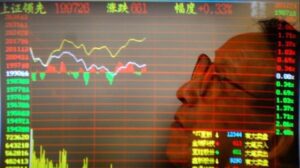
Stock indices of most major countries in the Asia-Pacific region (APR) are declining ahead of meetings of the world’s major central banks.
Traders evaluated the statistical data from China and Japan.
China’s Shanghai Composite index was down 0.35% by 7:41 a.m.
China’s Purchasing Managers’ Index (PMI) for the manufacturing sector rose to 50.1 points in January from 47 points a month earlier, data from China’s State Bureau of Statistics (SBS) showed. Experts on average expected it to rise to 49.8 points, Trading Economics noted.
The PMI above the 50-point mark indicates an increase in activity in the industrial sector. The value of the index exceeded this level for the first time since September against the background of the lifting of anti-commodity restrictions.
Combined profits of major Chinese industrial enterprises fell 4 percent year on year to 8.4 trillion yuan ($1.24 trillion) in 2022, according to the country’s State Statistics Bureau (SBS).
At the same time, the rate of decline accelerated compared to January-November, when the decline was 3.6%.
Meanwhile, Hong Kong’s Hang Seng indicator collapsed by 1.5%.
Sunny Optical Technology Group Co. Ltd. (-5.6%), Hang Lung Properties Ltd. (-5.3%) and Wharf Real Estate Investment Co. Ltd. (-4.2%).
Japan’s Nikkei 225 index was down 0.2% by 7:39 a.m.
Japan’s retail sales rose for the tenth month in a row in December 2022, the rate of increase accelerated and was better than analysts’ expectations.
Sales rose 3.8% from December 2021, the Ministry of Economy, Trade and Industry said. They were up 2.5% in November.
Experts polled by Trading Economics predicted a 3% increase on average.
Shares of Nippon Light Metal Holdings Co. Ltd. (-6.8%), Daiichi Sankyo Co. Ltd. (-4.5%) and Resona Holdings Inc. (-2.8%).
The value of South Korea’s Kospi dropped 0.9%.
Shares of one of the world’s largest chip and electronics maker Samsung Electronics Co. fell 3.3%. The company cut its operating profit by 69% in the fourth quarter compared with a year earlier amid a sharp drop in demand in its memory chip and smartphone divisions.
Shares of automaker Hyundai Motor fell 1.5%.
Australia’s S&P/ASX 200 index lost about 0.1% on the day.
The capitalization of the world’s largest mining companies BHP and Rio Tinto increased by 0.3% and 0.9% respectively.
At the same time the securities of Pilbara Minerals Ltd. fell by 5%.
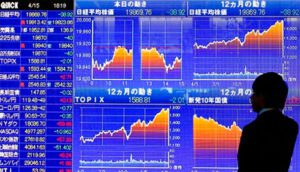
Stock indices of Asia-Pacific countries are changing differently on Wednesday morning because the dynamics of Wall Street the day before was also mixed and did not give direction to the Asian market.
At that trading activity remains below usual level as Chinese and Hong Kong stock exchanges are closed in connection with the celebration of the New Year according to the lunar calendar, MarketWatch notes.
Investors are assessing the statements of major companies over the past quarter and the statistical data from Australia.
As it became known on Wednesday, consumer prices in Australia rose by 8.4% year-over-year in December after climbing by 7.3% in November and well ahead of the forecast of 7.6%.
This sharp acceleration in inflation is largely due to higher real estate prices (new buildings jumped 16%) and motor fuel (10.8% after increasing by 8.4% in November), as well as recreation and cultural events (+14.4% vs. 5.8%).
Inflation was 7.8% in the fourth quarter, up from 7.3% the quarter before, a record high since 1990.
The jump in inflation raises the likelihood of another key interest rate hike by another 25 basis points by the Australian Central Bank in February, IG market analyst Yip June Rong said.
Australia’s S&P/ASX 200 index is down 0.15%.
Australia’s banking sector is mostly up on the prospect of higher interest rates, with Commonwealth Bank shares up 0.8%, ANZ Group up 0.1% and Macquarie Group up 0.7%.
Meanwhile, leading mining companies BHP Group and Fortescue Metals are down 0.8% and 0.4%, respectively, while Rio Tinto is down 0.6%.
The value of Japanese index Nikkei 225 increased by 0.5%.
Shares of Suzuki Motor Corp. (5.7%), Nippon Steel (4.5%) and Tokyo Electric Power Co. (3.3%) act as growth leaders among index components.
Nidec Corp.’s capitalization fell 5.7% after the electric motor maker sharply cut its full-year operating profit forecast due to shrinking demand and a slow recovery in the global auto industry.
South Korea’s Kospi Index jumped 1.3%.
The market value of Samsung Electronics Co. one of the world’s biggest chip makers rose 2.6 percent and automaker Hyundai Motor rose 0.7 percent.
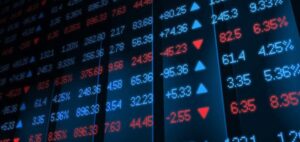
Stock indices of major Asia-Pacific countries are mainly down in trading on Monday except Japan Indicator amid a decline of Wall Street last week due to concerns about further interest rate hikes in the United States.
Investors fear that multiple key rate hikes by the U.S. Federal Reserve (Fed) and central banks in Asia and Europe to combat high inflation could push the global economy into recession, Trading Economics wrote.
By 8:17 Moscow time the value of Japanese index Nikkei 225 increased by 0.02%.
The most significant rise among the components of the indicator was demonstrated by share prices of beer producer Sapporo Holdings Ltd. (+2.9%), chemical company Teijin Ltd. (+2.8%) and insurer Tokio Marine Holdings Inc. (+2.3%).
By 8:21 Moscow time, China’s Shanghai Composite Index was down 0.7 percent and Hong Kong’s Hang Seng was down 2.1 percent.
The People’s Bank of China (NBK, the country’s central bank) kept its benchmark one-year lending rate (LPR) at 3.65% per year.
The rate for five-year loans was left at 4.3 percent per annum, the NBK said in a statement.
The regulator left the rates unchanged amid continued downward pressure on the yuan and a slowdown in economic activity amid rising coronavirus infections and new restrictions or lockdowns in a number of cities, Trading Economics wrote.
In Hong Kong, stocks of companies providing consumer goods and services declined significantly on Monday as investors’ attention shifted back to the coronavirus situation amid a rise in infections and the first report of a fatality from the effects of COVID-19 in nearly six months, Trading Economics wrote.
Hong Kong Chief Executive John Lee tested positive for COVID-19 after returning from the Asia-Pacific Economic Cooperation (APEC) summit in Thailand, the PRC Special Administrative Region government said.
According to the statement, Lee tested negative for COVID-19 all four days he was in Thailand. However, upon his arrival at Hong Kong airport, the head of the special administrative region’s administration received a positive test.
Leaders of the decline on the Hong Kong Stock Exchange include shares of restaurant chain owner Haidilao International Holding Ltd (-7.5%) and casino operators Sands China (SPB: 1928) Ltd (-7.4%) and Galaxy Entertainment Group Ltd (-7.3%).
The value of South Korea’s Kospi index by 8:15 Moscow timeframe dropped 1.3%.
One of the world’s largest chip and electronics maker Samsung Electronics Co. dropped 1.5%, while car maker Kia Corp. dropped 1.7%.
Australia’s S&P/ASX 200 index fell 0.17%.
Share prices of the world’s largest mining companies BHP and Rio Tinto fell by 2.25% and 2.3%, respectively.
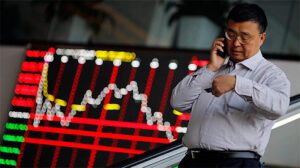
Stock indices of major Asia-Pacific countries (APR) mostly fell in trading on Thursday.
The exception was the Australian index, which rose amid statistical data showing an improvement in the unemployment rate in the country.
Pressure on other markets again have concerns about the negative impact of China’s tough policy in the fight against coronavirus, notes MarketWatch.
The value of Japanese index Nikkei 225 decreased by 0.35% by close of trading.
The volume of Japanese exports in October increased by 25.3% over the same month last year to 9.002 trillion yen (about $ 64 billion), according to the Ministry of Finance. The rise continues for 20 months in a row. At that, the growth rate slowed down from 28.9% in September.
Analysts on average had expected exports to rise 28.1% last month, according to Trading Economics.
Japanese imports soared 53.5% last month to a record 11.165 trillion yen. Analysts on average had forecast a 49.7% increase after a 45.7% rise in September. The index has been rising at a double-digit percentage rate for 18 consecutive months.
Shares of nonferrous metals producer Sumitomo Metal Mining Co. Ltd. (-5.4%), semiconductor maker Advantest Corp. (-3.1%) and electronics maker Tokyo Electron Ltd. (-3%).
Shares of Hitachi Ltd. rose 0.6%. The company’s unit won a major railroad contract worth about 114 billion yen ($817 million) from the Philippine Department of Transportation.
China’s Shanghai Composite index was down 0.15% and Hong Kong’s Hang Seng was down 1.2%.
Shares of game developer Netease Inc. (-9.1%), Internet company Meituan (-5.7%) and car dealer Zhongsheng Group Holdings Ltd. (-5.4%) were among the leaders of the decline on Hong Kong Stock Exchange.
Tencent Holdings Ltd. shares declined 0.8 percent. The Chinese internet giant increased its net profit by 1 percent to 39.9 billion yuan ($5.6 billion) in the third quarter compared with the same period a year ago because of a cut in expenses.
South Korea’s Kospi index fell 1.4 percent.
One of the world’s biggest chip and electronics maker Samsung Electronics Co. dropped 2.1%, while automaker Hyundai Motor dropped 1.2%.
Australia’s S&P/ASX 200 Index was up 0.09%.
Australia’s seasonally adjusted unemployment rate unexpectedly fell to 3.4% in October from 3.5% a month earlier. Experts polled by Trading Economics, on average, forecasted an increase to 3.6%.
Share prices rose in all four major banks in the country: the Commonwealth Bank of Australia – by 0.7%, Australia & New Zealand Banking Group – 0.5%, Westpac Banking – 0.2%, National Australia Bank – 0.9%.
At the same time stock quotes of the world’s largest mining companies BHP and Rio Tinto fell by 1.6% and 1.8%, respectively.
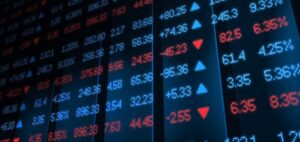
Stock indices of the countries of the Asia-Pacific region fall at the auction on Thursday, following the dynamics of the US stock market.
Exchanges in Japan are closed due to the celebration of the Day of Culture in the country.
Investors evaluate the results of the November meeting of the US Federal Reserve System. The American Central Bank expectedly raised the interest rate by 75 basis points, now its range is 3.75-4% per annum. It was increased by this amount following the results of the fourth meeting in a row. The rate is now at its highest level since January 2008.
At the same time, the Fed pointed to the possibility of slowing down the pace of rate hikes in the future. Fed Chairman Jerome Powell said at a press conference after the meeting that the issue would likely be discussed at the December meeting or early next year.
The Chinese Shanghai Composite index fell by 0.6% by 7:05 a.m. The Hong Kong Hang Seng lost 2.8%.
PC maker Lenovo Group is down 0.8%. The company in the second financial quarter increased net profit by 6%, but reduced revenue by 4%.
Papers of pharmaceutical CanSino Biologics Inc. cheaper by 26.5%. The company said it does not expect strong growth in profits from the sale of China’s first inhaled COVID-19 vaccine due to strong domestic competition and declining global demand.
Shares of other Chinese pharmaceutical companies also fall on this news. Stock quotes CSPC Pharmaceutical Group Ltd. lose 10.1% and lead the decline as part of Hang Seng, Sino Biopharmaceutical (SPB: 1177) Ltd. – decrease by 5.9%.
In addition, the securities of the video game developer Netease Inc. are actively losing in price on the Hong Kong Stock Exchange. (SPB: NTES) (-6.7%), casino operator Sands China (SPB: 1928) Ltd. (-6.1%) and online retailer Alibaba Group Holding (SPB: BABA) Ltd. (-6%).
China’s Purchasing Managers’ Index (PMI) fell to 48.3 in October from 48.5 in September, according to data compiled by Caixin Media and S&P Global. The indicator value above 50 points indicates an increase in business activity, below – its decline. The October indicator is below 50 points for the second month in a row and has updated the minimum since May.
Analysts note that the continued strict coronavirus restrictions in China contribute to the decrease in activity.
The South Korean index Kospi fell by 0.12% by 7:25 a.m.
Quotes of securities of one of the world’s largest manufacturers of chips and electronics Samsung Electronics Co. decrease by 0.5%, the cost of automaker Hyundai Motor decreased by 2.1%.
The Australian S&P/ASX 200 fell 1.8% on Thursday.
Share prices of the world’s largest mining companies BHP and Rio Tinto lost 3.1% and 2.3%, respectively.
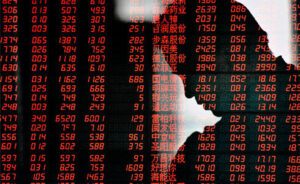
Stock indices of the countries of the Asia-Pacific region (APR) are changing without a single dynamics during trading on Thursday.
China’s Shanghai Composite index fell 0.5% by 8:20 qoq, while Hong Kong’s Hang Seng rose 1.4%.
Shares of online retailer JD.com Inc. are the leaders in growth of quotations on the Hong Kong Stock Exchange. (+8.2%), Budweiser Brewing Co. APAC Ltd. (+6.3%) and Alibaba Group Holding Ltd. (+5%).
Paper Pharmaceutical WuXi AppTec Co. jumped 6% after the release of strong third-quarter earnings.
Shares of Tsingtao Brewery Co. in Shanghai they lose 7% in price. Although the company increased its profit in July-September, the figure fell short of analysts’ expectations.
The total profit of large Chinese industrial enterprises fell by 2.3% in January-September 2022 compared to the same period a year earlier and amounted to 62.44 trillion yuan ($8.7 trillion), according to the State Bureau of Statistics (GSO) of the country. At the same time, the rate of decline accelerated compared to January-August, the decline for which amounted to 2.1%.
The value of the Japanese Nikkei 225 fell by 0.2% by 8:30 qoq.
The stocks of camera manufacturer Canon Inc. (-6%), financial Concordia Financial Group Ltd. (-5.2%) and Chiba Bank Ltd. (-5%).
Capitalization of construction equipment manufacturer Hitachi Construction Machinery Co. rises by 4.9% after improving the forecast for the financial indicators for the year and strong results for the first financial half.
The South Korean index Kospi added 1.5% by 8:40 qoq.
Quotes of securities of one of the world’s largest manufacturers of chips and electronics Samsung Electronics Co. grow by 0.5%, despite the fact that the company reported a drop in net profit in the third quarter by 24% due to lower demand for chips.
Shares of automaker Kia Corp. grow by 0.6%, Hyundai Motor Co. – by 0.3%.
The South Korean economy in the third quarter of 2022 grew by 3.1% compared to the same period last year, according to preliminary data from the Bank of Korea. Analysts on average predicted an increase of 2.8%, according to Trading Economics.
The Australian S&P/ASX 200 gained 0.5%.
The capitalization of the world’s largest mining companies BHP and Rio Tinto increased by 2.4% and 0.8%, respectively.